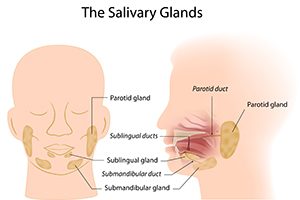What’s In Saliva?

Why Do We Have Saliva?
And why is it important to teeth?
Saliva plays a critical role in the digestive process. While the jaw and teeth do the hard work of chewing, saliva is there to provide moisture, lubrication, and help break down food. Then, of course, it also makes swallowing the food a whole lot easier.
Saliva is consists of about 98% of water. The rest is a particular combination of ingredients to help carry out its functions. These include mucus for lubrication and antibacterial agents to regulate the environment of the mouth. Finally, saliva also contains enzymes such as amylase, which breaks down starchy foods into sugars, jump-starting the digestion process.
Saliva is essential to the well-being of your teeth and mouth in several ways. It coats the teeth to protect them from bacteria in the air and keeps the tongue and other soft tissues moist. Without it, dry mouth (also called xerostomia) is a real concern. Dry mouth can lead to a higher incidence of cavities, tooth decay, bad breath (halitosis), and periodontal disease.
Keep It Flowing
The best way to maintain the proper amount of saliva is to stay hydrated. Make sure you drink plenty of water, especially when exercising and during the summer months. Its production also drops during the night, so be sure to brush and floss before and after this period when your teeth are most vulnerable.
If you find yourself waking up in the night with dry mouth, keep a glass of water at your bedside, or brush your teeth again to stimulate saliva production. During the day, chewing sugarless gum can also be a convenient option.
If you have concerns about dry mouth, please contact us today to schedule an appointment.



